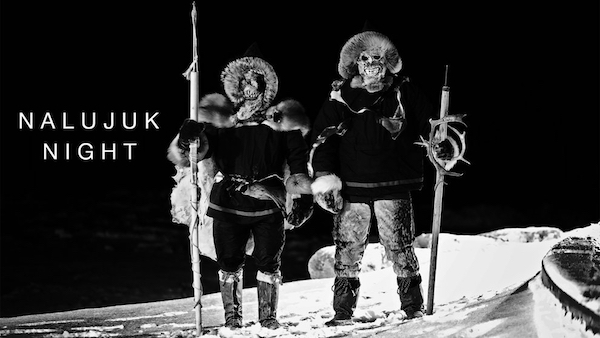

|
|||||
|
|
|
|
|
|
|
| Directed by Jennie Williams |
| Canada, 2021 (documentary, 13 minutes, black and white, English / Inuktitut) |
| Also known as "La nuit du Nalujuk", "Nalujuk Unnunga" |

|
| Image: © National Film Board of Canada |
|
Video (National Film Board of Canada)
Video (National Film Board of Canada) [Inuktitut] Video (National Film Board of Canada) [French] |
|
Film Description: "Nalujuk Night is an up-close look at an exhilarating, and sometimes terrifying, Labrador Inuit tradition. Every January 6, from the dark of the Nunatsiavut night, the Nalujuit appear on the sea ice. They walk on two legs, yet their faces are animalistic, skeletal and otherworldly. Snow crunches underfoot as they approach their destination: the Inuit community of Nain. Despite the frights, Nalujuk Night is a beloved custom, showing that sometimes it can be fun to be scared. Rarely witnessed outside of Nunatsiavut, this annual event is an exciting chance for Inuit, young and old, to prove their courage and come together as a community to celebrate culture and tradition. Inuk filmmaker Jennie Williams plunges audiences directly into the action in this bone-chilling black-and-white short documentary about a winter night like no other." -- National Film Board of Canada (source) |
| Film Credits (partial): | |
| Written by: | Jennie Williams |
| Produced by: | Latonia Hartery, Kat Baulu, Rohan Fernando, Annette Clarke |
| Cinematography: | Nigel Markham, Duncan de Young |
| Film Editing: | Justin Simms |
| Music: | Sarah Harris |
| Production Company: | National Film Board of Canada / Office national du film du Canada |
| Additional Credits: | Throat Singing / Chant de gorge : Jennie Williams |
"La nuit du Nalujuk est une tradition issue de la collectivité de Nain et n'existe nulle part ailleurs au Labrador ou dans l'Arctique canadien. L'authenticité et la singularité de cette tradition ont tout de suite intéressé l'artiste [Jennie Williams], qui a décidé de capter des moments de cette nuit étrange à travers la lentille de son appareil photo. Après douze ans de photoreportage, c'est derrière une caméra qu'elle poursuit ce projet atypique. [...] Le choix de faire un documentaire en noir en blanc n'est pas anodin non plus. L'ensemble des photographies prises depuis une dizaine d'années sont en noir et blanc, et Jennie Williams a souhaité garder une continuité dans son travail artistique. L'ambiance singulière qui se dégage des images est amplifiée par le noir et le blanc qui amènent une dimension plus dramatique et ancestrale à ce rite, selon la documentariste."
-- Nelly Guidici
(source)
|
|
|
|
|
|
|